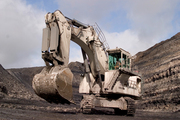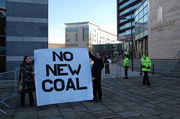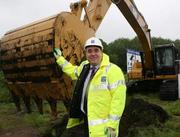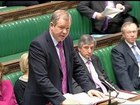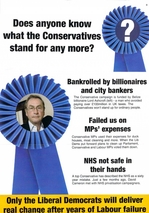 There's a lot of media love for our new masters, especially seeing how comfortable they looked at their civil partnership yesterday.
There's a lot of media love for our new masters, especially seeing how comfortable they looked at their civil partnership yesterday. Even the Guardian's Jonathan Freedland doesn't seem to have any buyer's remorse, though Seamus Milne never bought in.
It would also be churlish not to point out that there are matters where this administration are better than Labour. On ID cards, the third runway, perhaps even PR for the House of Lords, this is an improvement.
The nuclear stance is also marginally better than Labour's: the Tory line that they will support unsubsidised civilian nuclear remains, which if honestly implemented would mean no new nuclear power stations.
For now, the National Liberals (or Libservatives if you prefer) are more united than Labour were all by themselves. It occurred to me that during the one day of Lib Dem talks with both other parties they were actually testing the ability of the others' backbenchers to be responsible. The day's events demonstrated to the Lib Dem left that the practicalities of working with the Neanderthal wing of Labour would have been too dire.
But the fact remains that the Lib Dems have delivered government to the Tories. We're being urged to forget about the 1980s as awfully unfair. I beg to differ, and I hope Gary Younge will forgive me for quoting him at length:
"I don't have a phobia about Tories. That would suggest an irrational response. I hate them for a reason. For lots of reasons, actually. For the miners, apartheid, Bobby Sands, Greenham Common, selling council houses, Section 28, lining the pockets of the rich and hammering the poor - to name but a few. I hate them because they hate people I care about. As a young man Cameron looked out on the social carnage of pit closures and mass unemployment, looked at Margaret Thatcher's government and thought, these are my people. When all the debating is done, that is really all I need to know."
Then in turn Nick Clegg looked at David Cameron and thought "these are people I can do business with". I understand they were in a difficult position, having got the hung Parliament they always wanted, but locking us into 5 years of Tory rule cannot be the answer.
It's not very new politics, but I refuse to forgive and forget. The cabinet is now stuffed full of privatisers (both Tory and Orange Book versions) and homophobes (just Tories, as far as I know), people who liked what they saw when Maggie was in power. Beneath the libertarian veneer both parties' leaderships are driven by policies that suit the elites they represent, and the straight line runs from Thatcher through Blair to these two.
My inability to forgive is not restricted to the Tories, though. Labour have left a legacy so authoritarian that they have allowed this new coalition to look progressive on civil liberties. They have pushed politics so far to the right that this new arrangement looks almost centrist. They abandoned the poor to rising inequality, and any new Labour leader will be jeered for criticising the coalition's actions or inactions in this area. War is now totally mainstream, and only the Greens and the Nats provide Parliamentary opposition to nuclear weapons.
Which is why it mystifies me that Labour has seen any recruits from the Lib Dems. Sure, many people voted yellow to keep the blues out, but have they really already forgotten Labour's 13 years of betrayal, lightly seasoned as it was with first-term positives like devolution and the minimum wage?
Hence our year's free membership offer to those leaving Labour and the Lib Dems - extended to SNP members by request. Sign up here.

